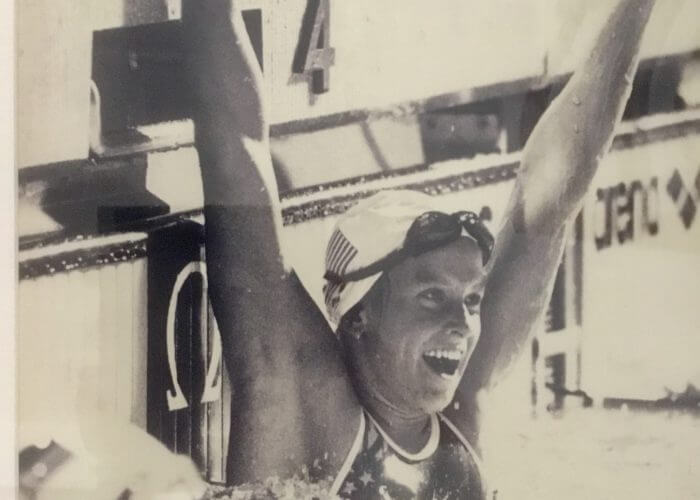Sippy Woodhead On Perspective In The Depths Of Life After Stolen Dreams

Weekend Essay: In Part 2 of an interview with Sippy Woodhead, one of the outstanding examples in swimming history of an athlete denied by events and circumstances beyond her control the opportunity to fulfill soaring peak-form potential in the pool, we begin where we left off in Part 1, Los Angeles 1984.
“I held on because I felt I had to. I did it for myself because I felt like I deserved to go to an Olympics, to go to an Opening Ceremony. I was glad to have a medal. But the experience? It was not exhilarating to me. It was just not what I had always hoped for.” – Sippy Woodhead
I’d asked Sippy Woodhead what it had felt like to go to a home Olympics in Los Angeles four years after boycott had “stolen the heart” out of her. Her answer reflected the drop and depression of an Olympic tragedy.
So much had come to pass that ought not to have been. And not an expert to turn to; no referral made by the guardians of a truly great swimmer. The ‘great swimmer’ is an opinion shared by a great many in swimming because it reflects fact. The lack of available help is what Woodhead told us about last week.
She found perspective in the depths of sorrow not even stolen Olympic dreams can compete with. Woodhead’s first husband, Michael Kanzer, died in a car accident in 1995. In time, beyond serious depression, she built a new life, married again, to Chris Brennan. The couple had twins, Jamie and Ryan (both swim competitively).
Last summer, while swimming, Chris suffered a heart attack and passed away. His death was devastating for the family. It is against that backdrop that we find Woodhead surveying the current swim scene and saying:
“Life is way more than the swimming thing. I read some of these articles about Michael Phelps being depressed and I’m like ‘wow’.”
She laughs, not at him but at the bracing gulf between her reality and his when it comes to Olympic experience, the wound of what went down and the help available (Phelps, of course, has spoken of the lack of help he and others received when suffering mental-health issues).
Her message to him is blunt but sincere:
“You’re unhappy. I’m sure it’s real to you but wait ‘til real life starts happening to you.”
The Weight of Gold; How To Measure Thee Silver Lining Of Sippy Woodhead?
Ask just about any Olympic-title shot emerging from a Games final a touch shy of the gold they’d worked for and a tone of silver lining is tangible in answers to questions often loaded with a warped emphasis on ‘so close, how disappointing for you’.
Those post-race encounters with media, coaches, team-mates (in that order because that’s how it often is) – and then, ultimately, self, the athlete staring back in the mirror, can be critical to perceptions, feelings and emotions that last a lifetime.
Pour in to the hard-but-fair pond of elite, competitive sport a drop of injustice – doping, boycott and so forth – and you have the makings of a toxin fit to corrode the Olympic spirit and the soul of its Charter, the book of post-Olympic outcomes whispers to those with an ear to hear.
Today, swimmers, coaches and others in various capacities around them are just starting to talk openly about mental health.
The more proactive sports authorities, albeit through change forged by The likes of Michael Phelps, Allison Schmitt and other athletes, their representatives and Safe Sport advocates working with victims and survivors, are catching on.
Far and wide, the tone remains as it has long been: ‘be tough; man up; deal with it’, the only ‘therapy’ prescribed and available.
Deal with it. Striking examples are to be found in the varied stories of Lance Larson, Rick DeMont, Shirley Babashoff, Allison Wagner and many others, including Dutch sprinter Enith Brigitha and what her story might have meant. Then there are waves of other European, American, Australian and other women thumped into submission by the GDR’s unchecked and rewarded-to-this-day systematic doping.

Sippy Woodhead
Sippy Woodhead belongs to the club. She might have been the Meyer, Gould, Evans or Ledecky of her day: at Moscow 1980, she would have been looking at title shots over 200, 400 and 800m freestyle plus three, not two, relays. A medal in the 100 in her sights, too.
Forever guesswork. What if is not what was. For Woodhead, there is no virtual. It’s all very real:
“There was no 4×200 free back then but we’d realistically been looking at a possible six medals. I would have had the 100 World record, too, if you take out all those East Germans.”
Consider that for a moment. The guardians and governors of the sport may scoff, may place it straight in a binding of ‘what if’ but the exercise of working out the world-record sequence across women’s events stripped of the GDR’s results is doable: the dates, swims and times of national championships and big international sets are all on the record.
What Woodhead suggests is correct and extends to this; in the years after Shane Gould’s unique feat at Munich 1972 decade, there might have been two Americans with a World-record range of 100 to 800m: Shirley Babashoff and Sippy Woodhead.
More than likely but not everyone is open to engaging in revision exercises without a deal of scoffing and shrugging. Officially, such exercises have been ruled out time and again by a silence and refusal to engage. As Woodhead notes with a chortle when sitting how it was on the cusp on catastrophic boycott, with a nod to GDR doping and other events that let clean athletes down in ways that have lived on beyond sporting careers:
“I only do that when my friend Wendy Bogliolo shows up.”
Re-calculating, shifting the sands of dark history remains one of the taboos of swimming, the sport’s record of dealings with such issues shows. Consequence spills well beyond the result sheet, as Woodhead’s experience tells us.
Sickness Within Sickness At Heart Of Sippy Woodhead’s Swim Story
How to explain it? Let’s try: sick to your stomach. The gnawing, debilitating side-effects of injustice, of having something stolen from you that can never be returned. Not trinkets or your favourite t-shirt. We’re talking a whole lifetime of difference.
Sippy Woodhead was one among many women who raced at peak form during the GDR era.

Sippy Woodhead, 1978 World title at 14 – Photo Courtesy: Sippy Woodhead
At the heart of her sport’s story is double trouble: as we learned in the first part of this feature, the 14-year-old was all for having a go at a time of enhanced opposition. She was not for viewing those suspected of using doping as unbeatable.
Then along came something else she had no control over: Olympic boycott led by her own country. The rug was pulled, the stuffing knocked out, depression set in.
Today, in 2020, we hover over that scene from forty years ago and the Subsequent struggle in a career blow off course from the moment politics pulled the plug. We hover, of course, with the knowledge of the intervening years and the cultural shift of the past few years, including openness on mental health.
What did it mean for Woodhead? As she already noted when I asked ‘who could you turn to”, the truth of the age was “no-one wanted to talk about it”.
One of the historic lines in the narrative of Woodhead the swimmer is: she got physically sick, the implication being that it was that, not the actual reason why she might have got sick, that left her shy of her young fastest forever more.
The U.S. and international news archives are singularly void of the reasons and attempts to explain why Sippy Woodhead got physically sick. There is no mention at all of the depression of a 16-year-old. There could be none: she could not and did not speak of it to her parents, her coach, let alone he media, in those days.
The Symptoms Of Depression
Turning to a few of the myriad online references, we find this:
“Feeling sad or anxious at times is a normal part of life, but if these feelings last more than two weeks they could be symptoms of depression. It’s estimated that each year 17 million American adults will experience depression. However, clinical depression, especially left untreated, can interrupt your day-to-day life and cause a ripple effect of additional symptoms.
“Depression affects how you feel and can also cause changes in your body. Major depression (a more advanced form of depression) is considered a serious medical condition that may have a dramatic effect on your quality of life.
“Depression can cause a lot of symptoms within the central nervous system, many of which are easy to dismiss or ignore.
Older adults may also have difficulty identifying cognitive changes because it’s easy to dismiss the signs of depression as related to “getting older.” According to the American Psychological Association, older adults with depression have more difficulties with memory loss and reaction time during everyday activities compared with younger adults with depression.
Symptoms of depression include overwhelming sadness, grief, and a sense of guilt. It may be described as a feeling of emptiness or hopelessness. Some people may find it difficult to put these feelings into words. It may also be difficult for them to understand as symptoms can manifest and cause physical reactions. Frequent episodes of crying may be a symptom of depression, although not everyone who is depressed cries.
You may also feel tired all the time or have trouble sleeping at night. Other symptoms include: irritability, anger, and loss of interest in things that used to bring pleasure … “
Like training, like working for a goal, an Olympic goal, like knowing you are one of the best swimmers in the world and the timing is perfect: World records at 14 and 15; into an Olympic year in the best shape of your life. Then, in a world as far away from yours as you might get, the Cold War freezes your World: Soviet Union soldiers enter Afghanistan = the Olympics are off.
Returning to modern definitions and one of many online references on mental health, we read:
“People with depression may have trouble maintaining a normal work schedule or fulfilling social obligations. This could be due to symptoms such as an inability to concentrate, memory problems, and difficulty making decisions.
“While depression is often thought of as a mental illness, it also plays a heavy role in appetite and nutrition. Some people cope by overeating or bingeing. This can lead to weight gain and obesity-related illnesses, such as type 2 diabetes. You may even lose your appetite entirely, or fail to eat the right amount of nutritious food. A sudden loss of interest in eating in older adults can lead to a condition called geriatric anorexia.
Depression and stress may have a negative impact on the immune system, making you more vulnerable to infections and diseases. One review looked at studies and found that there seemed to be a relationship between inflammation and depression, although the exact connection is unclear.
“Inflammation is linked to many illnesses, such as stress. Some anti-inflammatory agents have shown to benefit some people with depression.“
Contrast that with the message for 16-year-old Woodhead in 1980: deal with it … but please do so on your own, quietly, in your own corner, then come out fighting and show us your resilience, give us a ‘Hero Made Good” golden ending so that we can all feel good and avoid the unnecessary embarrassment of raking over old coals.
Sippy Woodhead – Beyond Moscow 1980
I ask Sippy Woodhead about the 1982 World Championships. She was missing. What happened?
“Oh, I was so sick that summer. Super-sick. I never recovered. It was like some kind of pneumonia and it just took everything out of me, so I didn’t go.
“Honestly, I was fine in other ways. I’d worked through it and my plan was to go to the University of Texas and swim with Paul Bergen after the 1980 blowout.
“That was where I was going to get myself together and get back on the train and get this done and I was just going to put everything I had into it. I went to school in the fall of ’82 and when I get there, he [Bergen] announces he’s leaving.
“That broke me again. There was my plan. Gone. Again. It was out the door. I was sitting there after about three weeks in Texas and thinking ‘what the heck am I doing here’ because they didn’t have a coach; they didn’t know who they were going to get. I said ‘You know what, I’m leaving; I gotta go’.“
At 18, a multiple World record holder: no money, no ISL, no circuit, no federation guidance. Once more, no-one to turn to. In time, it would also mean that she avoided ever having had to work with a coach who would come to be accused of sexually abusing swimmers.
On Bergen, Woodhead says: “I was so spooked when that all came out. I just couldn’t believe it. I was obviously not his type because I never got that vibe from him.”
She empathises with the victims who, like her for wholly other reasons, had no place to turn to back them, no-one to talk to. Some survivors even heard from police a recommendation of ‘best go home and not make this a further embarrassment for you and your family’.
Some victims of the 1970s have talked of a time when there was no hug to be had, no basic comfort of an ‘are you ok’?
It was all too shocking, too scandalous, the imperative to bind the wound so that none may see. Sippy Woodhead gets that:
“That was sort of like me and the boycott as far as who you could talk to. There just was no-one to talk to. After the boycott was announced, no-one came to hug me. My mom threw the cat in my room and shut the door.”
Psychology 1980-style? “Yeah, right – have an animal!” Says Woodhead.
Humour has helped her to deal with what others might have helped her deal with in a way that could have led to a different sporting outcome. But they did not and were incapable of doing so in that moment, place and time.
Imagine chucking the cat in for comfort during COVID season – ‘hey, Olympics, last season of NCAAs blown out? … cuddle that and get over it!”
Says Woodhead: “I think the kids now don’t know how good they have it.”
Even so, her empathy with their plight is clear. Their summer of 2020 is like her summer of ’80 and several more to come: ripped from the page. Telling them there’ll be another year is not the best way to handle it, she says.
Woodhead is living proof of that: the potential of 1978-79 is where her best form stayed. The soaring likelihood that 1980 would have been her towering moment of sporting achievement was turned to ashes not by the systematic doping of others or lack of commitment or poor choices or any of the other possibilities on a long list of why sport can be brutally unfair or brutally honest.
No. Her career was forged in the furnace of politics summed up succinctly by Tracy Caulkins when she noted that nine years on from Moscow 1980 the Soviet soldiers left Afghanistan, Olympic boycott having had no impact on that situation, athletes the only victims.
What happened to Woodhead after summer ‘80?
“I went home. I ended up going to USC. I got out of shape working out there with the women’s team. I ended up swimming with the men’s team a lot and created a bunch of class conflicts so I could not make the women’s practices. It forced me to go to the men’s practices, which is what I wanted. I did it on purpose.
“I worked out with Peter Daland. That worked out and I got better and I actually swam with him for ’84. It was too little too late. I hadn’t got it together.”
The result sheet tells us ‘silver, 200m freestyle, inside 2mins, fast for the time, well down on her 1978 World-record pace.”
It was mostly written up in that way, if it was written up at all.
How did Sippy Woodhead feel when the Games were over? Ponder the depths in her answer:
“I just felt like ‘it’s over’, the nightmare is over. I did what I did. In my mind I will always have the ’78 World Championships and those memories were incredible. I broke a world record head to head against an East German.
“I know some people say you’re nothing unless you have an Olympic gold medal but I don’t really believe that. I had a great experience and that was history. What happened is history and I just thought ‘its over’ and since then its a case of that’s just what happened to me in my lifetime. I can’t change it.
Deep Perspective
Sippy Woodhead has had two husbands in her life, Michael Kanzer and then Chris Brennan, a Wall Street trader. She suffered the sorrow and struggle of grieving for both in tragic circumstances: Michael died in a car accident in 1995; Chris, the father of his and Sippy’s twins, Jamie and Ryan, passed away last summer after suffering a heart attack.
Such depths of experience sink a missed Olympics from long ago to the sea bed of life-shaping moments. Woodhead tells me:
“Obviously it’s all (1980 and all that) been put in a lot more perspective since. I lost my first husband in a car accident. My next husband died last summer. So, what happened back then [as a swimmer] is so small to me now.
“My biggest hope for swimmers these days is that they’re enjoying it and that they’re having a good time. I couldn’t care less how fast they swim. It’s about whether they enjoy the experience or not.“
It is there that we discuss the messages and campaigning of Michael Phelps and others. Their voices can and do help others who are struggling but real change in sport will only happen, Woodhead believes when the shape of governance is changed.
Could things have been improved long ago with better leadership? “Oh, absolutely,” says Woodhead.
The Longest Pause
We return to the depression she suffered as a 16-year-old left to cry alone, cuddle the cat, work through it in a world apparently free of adults able to give her a hug, let alone have a deep conversation about real feelings.
Had that depression of the 1980s lived with her ever since?
“No, I think …”. There’s a long pause, a pondering silence, a heavy sigh. It’s the first hesitation in a long and fascinating conversation with a bright mind rich in experience.
Woodhead winds back. How to look back and find the moment where her sadness waned and the rest of life took over?
“After I finished swimming and I met my first husband and I was truly just happy again. I felt like I’d felt when I was 14 again. I hadn’t felt like that since I was 14-15. I knew I was myself again and I hadn’t been that happy for so long. It seemed like forever.
“We were married seven years and then he died in a car accident and that was the most depressed I’d ever been. I couldn’t sleep for two years. Everything that was was no more.
“When that happened again last summer, I knew what the drill was, I knew how grief goes but to watch my kids go through that was just gut-wrenching. That’s the worst experience of my life now.
So, where does the boycott fit?
“No, just not up there but in the context of what you do to a kid at that age, you know, that’s painful.
“I look at my kids going through this COVID thing right now. In California, we’re pretty locked down and that just keeps stealing stuff from them. Everything they’ve lived for has a stranglehold on it right now and I’m like ‘at what point does anybody care about the kids?’
“No child under 18 has died in California but its like ‘you are just killin’ ‘em by stealing everything they believe in right out from under ‘em. To mee, that’s how I felt.
“They live for the hope that thi is gonna be over. That’s what it felt like to me back them. It will be over but right now their lives are just decimated. The kids from the poor parts of town, inner cities: I can’t even imagine … you’ve got kids that work their way out of that [poverty] but they can’t right now – they’re just stuck.
Some of them live to go to school every dy and they cant even do that.
Context Then And Now: Tokyo202One In Doubt

Tokyo 202One – Photo Courtesy: Tokyo 2020
Sippy Woodhead lives 20 yards from a beach on the Pacific Coast. During Covid-19 lockdown, the beach has been closed, The ocean out of bounds.
“We couldn’t even go stand on the beach,” she says, exasperated as she mentions the graduation ceremonies cancelled, the lives put on hold. It takes her back:
“The way kids are having their dreams taken away right now is so similar to what happened in 1980.“
There is a sense of Olympic loss about to be repeated as Woodhead expresses doubt in the current climate that Tokyo 202One will happen at all.
“Some of these kids were going to go to college. Swimmers. In a year they’re seniors and they’ve got no times and you know programs are getting lost. And you know what, I don’t think these Olympics are going to go off at the end do this.“
They’re all looking at this as athletes missing out. No, that’s not the bigger picture and driver out there … it’ll be about the livelihoods that are being lost, the huge cost of it all.“
She was delighted to hear that Tokyo 2020 would be postponed to cancelled but, and avid reader of financial news, Woodhead says “it just doesn’t add up.”
“I this there could be serious issues and you’re gonna have another generation with stolen dreams … tell Michael Phelps to deal with all those people. I feel badly because I think that’s what’s coming. I don’t know how they’re going to help these people because it was devastating in my day.”
Coach Woodhead
Sippy Woodhead was not done with swimming when her racing days ended in 1986. I ask her to described what her relationships with swimming had become.
She stayed at USC, was assistant coach there for 10 years but life took the turn she would wish on no-one:
“When my first husband died I was working for Mark Schubert and he was a horrible boss. He’d admit it now. We get along fine. But it was miserable working for him.”
A short peel of laughter later, she explains: “I was very good at multi-tasking. I’d keep 11 balls in the air at once and he’d grow me a 12th one and not say thank you. He couldn’t’ even say good morning. So I was like, you know what, I can’t do this anymore. I literally quit. In the middle of the season I walked out.”
She walked away from a calling, something that might have become a vocation. Says Woodhead:
“I just always wanted the kids to have fun. I spent most of my time at USC helping the kids who were upset, kids who were having a hard time with their own lives. It became more important to me that they were having a good time than the times they were doing in the pool.“
Degree In Counseling Psychology
She graduated with a Masters in counseling psychology. She had been working towards a role in the counseling office at USC’s Athletics Department.
”That was my goal,” she recalls.
“Then my husband died and I was like ‘I can’t help anybody ‘cos I gotta help myself. I’d planned to use my Masters but I seemed to be using it on myself. I still am.”
Good friends told her to make a change, see a new journey and a different path in life. Beyond “the worst depression of my life”, Woodhead took up golf and down the road was introduced to the man who would become her second husband and father to their children.

Sippy Woodhead and her kids, Ryan and Jamie Brennan, with the family’s canine chums, Baxter, right, and Rio – Photo Courtesy: Sippy Woodhead
The twins have just turned 17. It’s been the toughest time for them. Both swim but the loss of his father led Ryan to set swimming aside for a time. The world moves on regardless and while Jamie kept up swimming and has had dozens of offers from colleges, Ryan had no times for last season.
Woodhead has been deliberately “very hands off” with their swimming. She says:
“I don’t want them to fee they have to live up to anything I did. I pretty much stay out of it and just be supportive. My sone didn’t swim last summer. He was devastated that his dad had died. He worked out but he didn’t train. Jamie did but Ryan’s reaction was like mine with the boycott: he just couldn’t do it.
“Everybody understood that. My daughter decided to swim. She go a little bit better so she’s getting recruited and he’s not, where he would have been too. Now he’s got no times so its been a bummer for him this whole thing.“
There are hugs and conversations, while talk of college reminds her that someday when the kids are not always there she will “have to get 15 animals or whatever” (laughter) To fill the gaping void.”
Woodhead is active: she skis, plays golf, and until last year competed in masters cycling. As the sole parent, she won’t do that now “because i don’t want to get killed on the road …”.
Woodhead never became the counselor she wanted to be but she counsels herself wisely on many levels.
Where A Dream All-Too Short-Lived Was Born
I ask her to leap back to the 1970s and tell me, beyond her own experiences of becoming a World Champion and record holder, what moments live in her yet as the safest, happiest of places to go when looking back.
Without hesitation, Sippy Woodhead replies:
”I went to Olympic Trials at 12, made the standard in 6th grade. It was only an hour’s drive from my house. I remember the girls qualifying and Kim Peyton getting locked in the bathroom to get drug tested.
‘They were all talking about Montreal 1976 and getting their team kit. I remember Gary Hall winning and holding his son up. And I thought ‘I wanna do this … I’m gonna do this’.
“It just looked like great fun. I can still picture it. It was exciting and I was gonna do that. I was always gonna do that.“
I mention the gnawing feeling of injustice and how I hate the way it turned out for her. Says Woodhead, tellingly, honest and thoughtful as she chooses the words than mean what she wants to say:
“That’s alright. I mean, its ok now.“
Forty Years On.




Was waiting for part2 and you delivered beautifully. My heart goes out to Sippy, but she would probably smile, say thank you and tell me to get on with my life and be happy. She’s a treasure. I wish the USOC or USA Swimming would take advantage of this special human being. She has so much to give……
Thank you, Craig, for this masterpiece. This one belongs in the hall of fame.
Love what she says: “My biggest hope for swimmers these days is that they’re enjoying it and that they’re having a good time. I couldn’t care less how fast they swim. It’s about whether they enjoy the experience or not.“
I waited all week for Part Two, and I wasn’t disappointed. Thank you once again for these pieces – I only hope you plan to talk with more champions about their experiences in the sport at that point in time!
Terrific writing Craig. Sippy’s story is one of incredible inner strength. How many people can come back from these body blows and keep their head on straight? In way Sippy was “cursed” by talent. As a swimmer, she was so good that when the boycott was announced she faced an unknown challenge. Life dealt her more challenges that may have destroyed a lesser person. In retrospect,it was my honor to have known and worked such a tower of strength.
Thanks for sharing so much of your life details.
We love you Sippy.
I remember my coach talking about how she packed her bags for championships/ Olympocs months before. Such a strong mind and heart! Loved watching her!